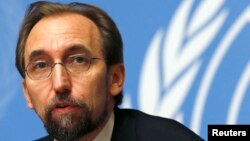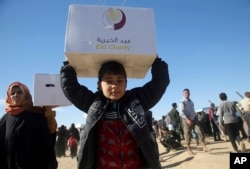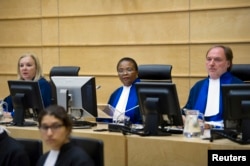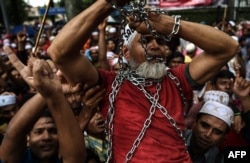U.N. High Commissioner for Human Rights Zeid Ra’ad al-Hussein has warned of an alarming deterioration of human rights and an erosion of international institutions and laws threatening the social cohesion of nations.
During a year-end review to the U.N. Human Rights Council, the high commissioner singled out an agreement between the government of Colombia and the FARC rebel group, which ended more than five decades of war, as a rare bright spot in an otherwise troubling human rights picture.
High Commissioner Zeid said he is particularly concerned about the worsening situation in the northern Syrian city of Aleppo.
"Most shockingly,” he said, “my office has no access to any area of Syria, even as the vast majority of the people of eastern Aleppo are still trapped in a sharply worsening siege.”
The United Nations has not been able to deliver food or other humanitarian aid to the estimated 275,000 civilians in eastern Aleppo since early July. The World Food Program distributed its last stock of food rations to the besieged inhabitants on November 13.
“Pounded by accelerating bombardment and deliberately deprived of food and medical care, many of them - including small children - report that they are simply waiting for death,” Zeid said. He called this “a nightmare which clearly violates the most basic norms of human rights and any shred of human decency.”
Iraq
Reporting on Iraq, the high commissioner’s deputy, Kate Gilmore, enumerated the many serious breaches of international human rights and humanitarian law being committed by Islamic State militants in their effort to prevent the Iraqi military from retaking the city of Mosul.
She said IS, also known as ISIL, was installing rocket launchers and placing snipers on the rooftops of civilian homes.
”Those who refuse to allow their homes to be used for these purposes are threatened or killed,” she said. “Families are effectively used as human shields, placed squarely and deliberately in harm’s way.”
She said hundreds of people have reportedly been abducted by IS and moved to unknown locations and people suspected of leaking information to the Iraqi Security Forces were killed.
Gilmore cautioned against giving into despair. She said it was high time for all parties, all communities, and all Iraqis to “start planning for the day after ISIL.”
She said, “There urgently needs to be a negotiated, inclusive settlement for all people of Iraq to break the cycles of violence and to build a truly inclusive democratic state with full respect for human rights.”
For this to happen, she said it was important that there be “justice for victims and survivors of crimes, violations and abuses.”
ICC withdrawals
While agreeing with this assessment, High Commissioner Zeid said he was worried that international concern for victims’ justice was wearing away. Without naming them, he noted that three countries - South Africa, Burundi and Gambia - have announced plans to withdraw from the International Criminal Court, and a fourth country - Russia - also had changed its mind about joining the ICC, which prosecutes war crimes, genocide, and crimes against humanity.
“These withdrawals, in my view, are a betrayal of the rights of victims of the most grave human rights violations,” he said.
Zeid warned the erosion of international institutions and laws is threatening global instability and, in turn, was leading to a rise of xenophobia and intolerance in many states.
Zeid said many of his recent missions to western Europe and North America included discussions of “increasingly worrying levels of incitement to racial or religious hatred and violence, whether against migrants or racial and religious groups.”
He accused political leaders of stoking discrimination and said the number of hate crimes appeared to be rising in several countries.
Ethnic discrimination
The high commissioner also turned to what he called “two especially worrying situations” - Burundi and Myanmar. He said growing fear of ethnic discrimination in Burundi was swelling the exodus of refugees, with numbers increasing from 270,000 to 325,000 during the past four months.
Zeid denounced the Burundi government's plan to launch a review of the “ethnic balance” in all public and semi-public institutions. He said the requirement for all staff to declare their ethnic identity was “a potentially dangerous move.”
He expressed alarm at reports from Myanmar of alleged “extrajudicial killings, arbitrary arrests and detention, torture, sexual violence and massive destruction of houses,” during security operations in northern Rakhine state.
Zeid said these operations have “led to the displacement of up to 30,000 members of the Rohingya community” during the past seven weeks. He warned security operations that violated fundamental human rights would “deepen grievances and may lead to far greater violence.”







